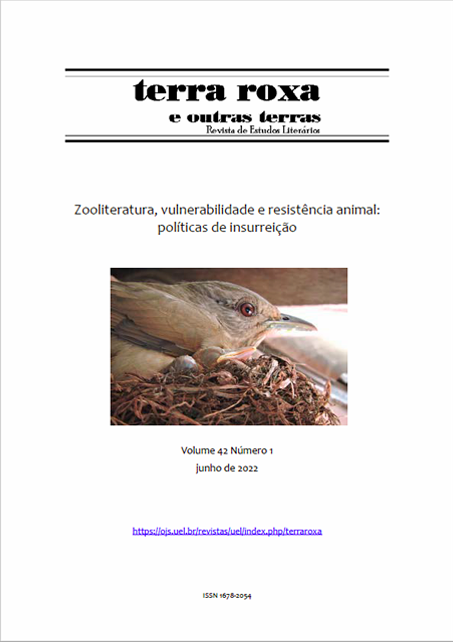Animal representation and human domination: a study on "O sofá estampado". by Lygia Bojunga
DOI:
https://doi.org/10.5433/1678-2054.2022v42p57-67Keywords:
Estudos Animais, zooliteratura, Lygia Bojunga.Abstract
Animal Critical Studies as an investigation field has gained large contributions in recent decades by paying attention to relationships between human and non-human animals. Using theoretical contributions focusing on animals and nature in literature, like studies by Kerridge and Sammells (1998), Culler (2016), Agamben (2004), Singer (2010), Berger (2003), Maciel (2007) and Bravo (2011), this article investigates how animals are represented in Lygia Bojunga's O sofá estampado (1980), regarding the domination promoted by human beings. By analyzing and discussing the characters of the book, we found three faces of the representation of animals in relation to the dominant power of human beings, the first of which refers to the figure of the animal dominated by the human being. Secondly, the dominated animal overcomes this condition, but reproduces the behavior of the human dominator. Finally, the animal is aware of human domination and engaged in the fight for the rights of animals and nature.
Downloads
References
AGAMBEN, Giorgio. The open: man and animal. California: Stanford U P, 2004. DOI: https://doi.org/10.1515/9780804767064
BERGER, John. Por que olhar os animais? John Berger. Sobre o olhar. Trad. Lya Luft. Barcelona: Gustavo Gili, 2003. p. 11-32.
BOJUNGA, Lygia. O sofá estampado. 32. ed. Rio de Janeiro: Casa Lygia Bojunga, 2015.
BRAVO, Álvaro Fernández. Desenjaular o animal humano. Maria Esther Maciel, org. Pensar/escrever o animal: ensaios de zoopoética e biopolítica. Florianópolis: Editora da UFSC, 2011. p. 221-243.
CULLER, Jonathan. Teoria Literária hoje. André Cechinel, org. O lugar da teoria literária. Florianópolis: EDUFSC; Criciúma: Ediunesc, 2016. p. 83-99.
KERRIDGE, Richard, Neil Sammells, orgs. Writing the environment: ecocriticism and literature. London: Zed Books, 1998.
MACIEL, Maria Esther. Zoopoéticas contemporâneas. Remate de males, Campinas, v. 27 n. 2, p. 197-206, 2007. DOI: https://doi.org/10.20396/remate.v27i2.8636004. DOI: https://doi.org/10.20396/remate.v27i2.8636004
SINGER, Peter. Libertação animal. São Paulo: WMF Martins Fontes, 2010.
Downloads
Published
How to Cite
Issue
Section
License
Copyright (c) 2022 Terra Roxa e Outras Terras: Revista de Estudos Literários

This work is licensed under a Creative Commons Attribution-NonCommercial 4.0 International License.
Authors who publish in this journal agree to the following terms:
a) The authors retain the copyright and grant the journal the right of first publication, the work being simultaneously licensed under the Creative Commons Attribution-NonCommercial 4.0 International License, allowing the sharing of the work with acknowledgment of the authorship of the work and initial publication in this journal.
b) Authors are authorized to assume additional contracts separately, for non-exclusive distribution of the version of the work published in this journal (eg, publish in an institutional repository or as a book chapter), with acknowledgment of authorship and initial publication in this journal.
c) Authors are allowed and encouraged to publish and distribute their work online (e.g. in institutional repositories or on their personal page) after the editorial process, as this can generate productive changes as well as increase impact and citation of the published work (See The Effect of Open Access).
d) The authors of the approved works authorize the journal to, after publication, transfer their content for reproduction in content indexers, virtual libraries and the like.
e) The authors assume that the texts submitted for publication are of their original creation, taking full responsibility for their content in case of any objection by third parties.




















